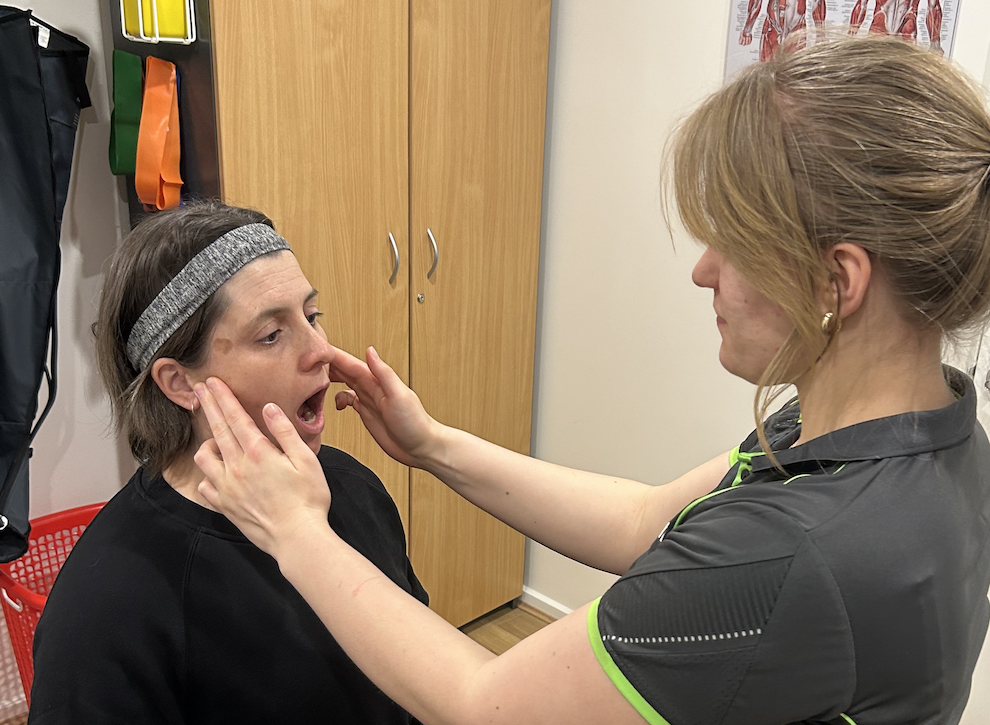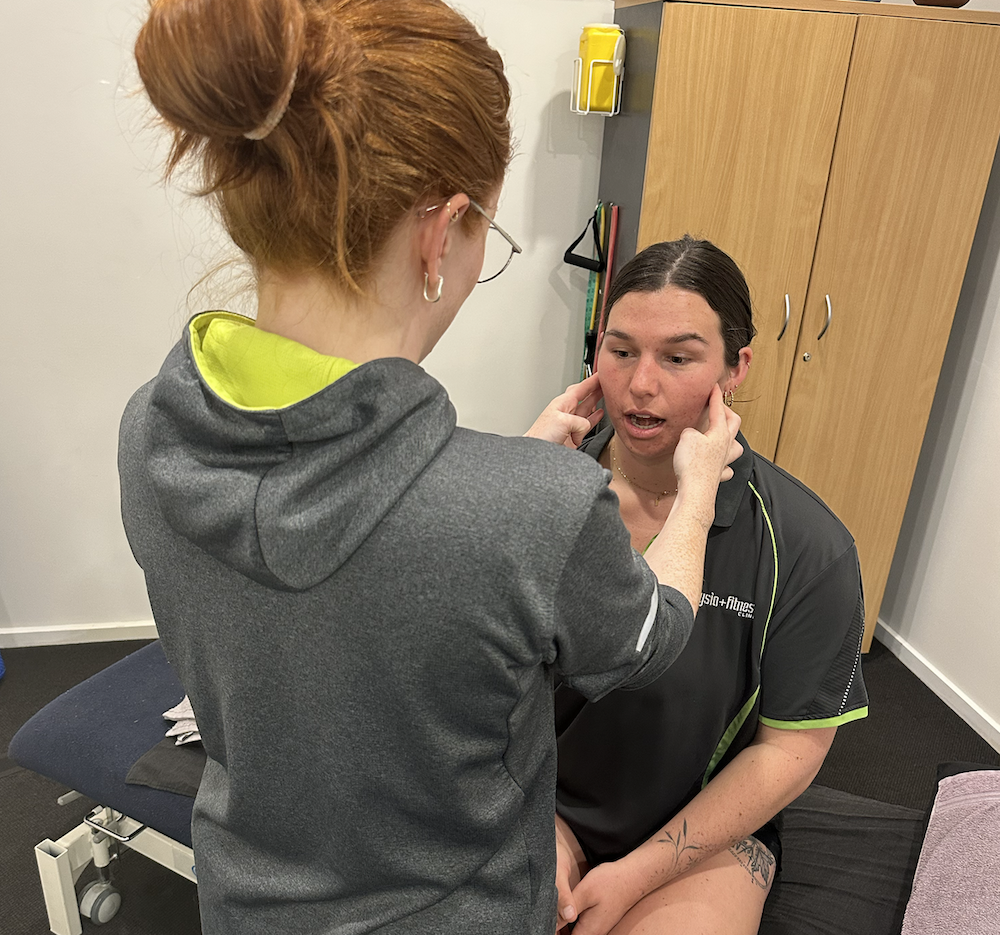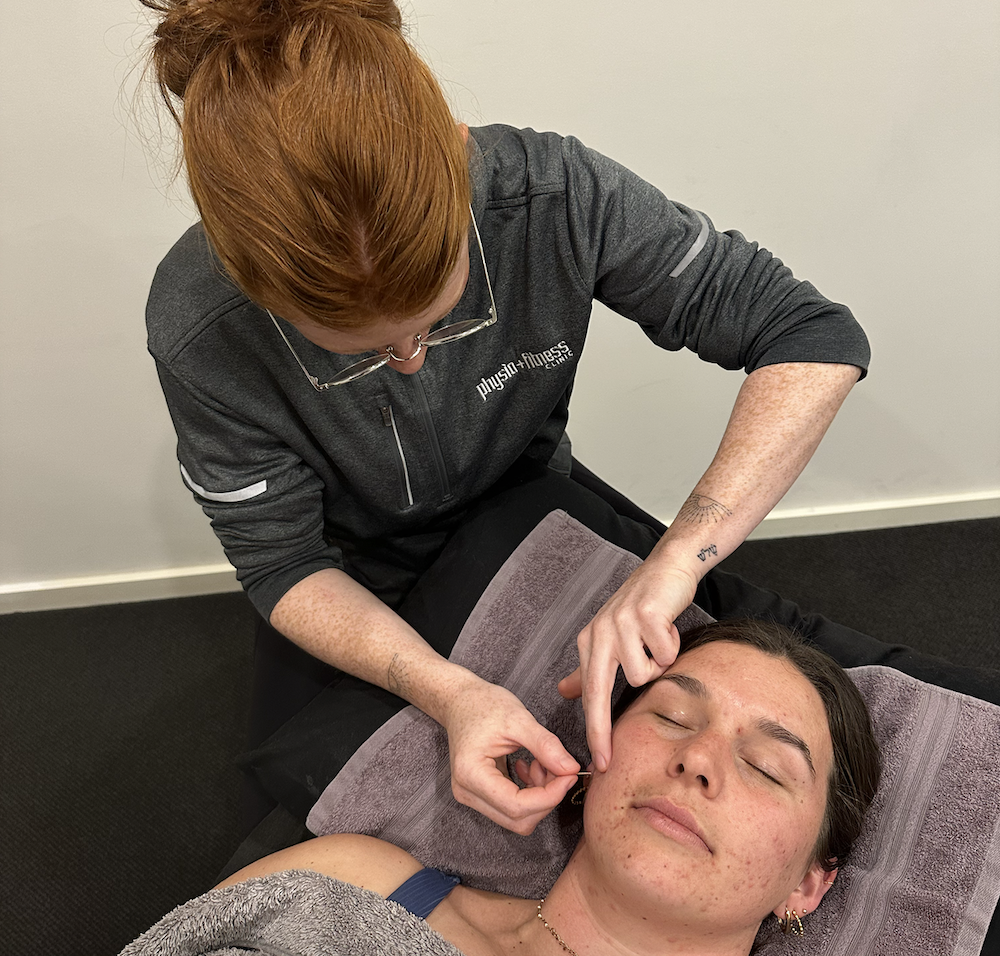Jaw, Neck and Headache Treatment
At Physio and Fitness Clinic, we specialise in treating TMJ (temporomandibular joint) disorders with a holistic and hands-on approach.
Georgia and Ebony, our expert myotherapists, is dedicated to helping you find relief from jaw pain, headaches, and other TMJ-related issues. With lots of training, and a passion for restoring balance to the body, she uses personalised techniques that target the root causes of discomfort, improving your overall well-being.
Whether you’re dealing with jaw clenching, muscle tension, or clicking sounds, Ebony and Georgia are here to guide you on your path to recovery.

Jaw, Neck and Headache Treatment
At Physio and Fitness Clinic, we specialise in treating TMJ (temporomandibular joint) disorders with a holistic and hands-on approach.
Georgia and Ebony, our expert myotherapists, is dedicated to helping you find relief from jaw pain, headaches, and other TMJ-related issues. With lots of training, and a passion for restoring balance to the body, she uses personalised techniques that target the root causes of discomfort, improving your overall well-being.
Whether you’re dealing with jaw clenching, muscle tension, or clicking sounds, Ebony and Georgia are here to guide you on your path to recovery.
What is the TMJ and why is it important?
The temporomandibular joint, commonly known as the TMJ, are a pair of joints that connect the jaw to the skull. They are located just in front of the ears and are involved in very important functions such as breathing, yawning, talking, and chewing just to name a few. When there are dysfunctions in the TMJ (referred to as Temporomandibular dysfunction (TMD)), it can even hinder your ability to smile!
Symptoms that stem from your TMJ can manifest in many ways, including but not limited to:
- Pain in the head, face, ear, jaw, teeth, neck, or even shoulders!
- Headaches
- Stiffness (limited movement) in the jaw
- Jaw locking (opened or closed)
- Clicking or popping when opening and/or closing the jaw
- Bruxism, clenching, grinding
- Stress, psychological, and social factors
- Posture

What to expect when you go to a Myotherapy appointment at Physio and Fitness Clinic for your jaw?
The goal of a treatment with your myotherapist at Physio and Fitness Clinic is to reduce pain and tightness, increase range of motion, and form a preventative plan to ensure those unwanted signs and symptoms never come back.
A typical consultation with your myotherapist will be thorough and will typically consist of a subjective and objective assessment, followed by manual treatment (examples including: soft tissue/myofascial release, dry needling, joint mobilisations), education, and a prescription of movements and/or exercises you can do at home. We make sure nothing is missed, so we also dive into assessing the neck and shoulder as well.
Although unlikely, if we detect something that is out of our scope of practice, we will ensure we direct you to a health professional / specialist that can get the job done.

Jaw neck & headache treatment FAQs
Q. Are TMJ and mental health connected?
A.
The link between the temporomandibular joint (TMJ) and mental health is strong and often overlooked. The cause of TMD is multifactorial and includes biologic, environmental, social, emotional, and cognitive reasons.
Stress, anxiety, and depression can lead to behaviours like teeth grinding (bruxism), jaw clenching, and poor posture, common contributors to TMJ disorders.
In turn, chronic TMJ pain and dysfunction can increase emotional distress, disrupt sleep, and lower overall quality of life, creating a cycle where mental health and physical symptoms reinforce each other. Addressing TMJ issues often requires a holistic approach that includes not just physical treatment but also support for managing stress and mental well-being.
Q. Can I claim my treatment on my Private Health Insurance?
A. Yes, as we have trained myotherapists and remedial therapists treating you, the myotheraphy sessions are claimable via Private Health Insurance. But it’s a good idea to contact them to confirm it’s covered, and read your policy to understand the limits of your cover. If you want to be certain you’re covered, you can add in Natural Therapies into your extras on top of your regular Private Health Insurance benefit.
Q. Why is treating your TMJ pain so important?
A. Many clients and health practitioners are not aware of the pain and dysfunction that the Temporomandibular joint – or TMJ for short (jaw joint) can cause and are left scratching their heads as to why their headaches/migraines, neck pain, shoulder pain and stress are not getting better.
Most people are aware of when their neck is sore and can also often link their upper body to the cause of headaches…..but when the TMJ is involved if you don’t treat this area you will be left with unresolved headaches, facial pain, toothache, and ear ache (assuming these structures are not in a diseased state themselves, and cleared by a medical practitioner).
Q. How will this help headaches and neck pain and trigger points?
A.
Neck pain and headaches are very common, and can be caused by a multitude of factors. The muscles of the face and jaw are connected to those of the head and neck, and when those are tight or strained due to TMD, they can lead to tension headaches.
Tension-type headaches are the most prevalent type of headache and is commonly associated with myofascial pain and the presence of active myofascial trigger points (MTrPs). MTrPs are hypersensitive nodules with a local or distal referred pain pattern, activated due to factors such as muscle fatigue, mechanical overload, or psychological stress.
Myotherapists can help with desensitising these trigger points and therefore reducing pain, and increasing range of motion. Muscles in the neck and Jaw often refer pain to areas of the body where they do not attach. An example is the sternocleidomastoid muscle in the neck that can refer pain in the forehead.
Q. How does Physio and Fitness go about relieved pain in your TMJ joint?
A. To start with we will do a thorough history taking (including asking dental history, if you breathe through your mouth or nose at night and any trauma to the area) then look at range of motion, where the pain complaint is, and what type of pain is occurring. We will ask you the specific pain history of your jaw (when did it start, what makes it better/worse etc).
There may be times where we need to refer to a specialist (such as a dentist to have a plate fitted etc), otherwise a lot of jaw pain will be within our scope of practice!
Georgia’s treatment methods include soft tissue/fascial treatments both inside and outside of the jaw, myofascial dry needling, mobilizations of the joint and exercises/stretches to take home.
Most of the time the neck is looked at as well. We will discuss the root cause of the issue to prevent the condition getting worse or re-occurring once fixed.
You will also have access to cat via email to make sure we are getting the right tailored treatment that is individual to you as a client and you are not left pondering if you have questions between treatments.
